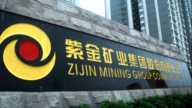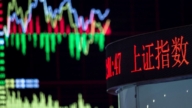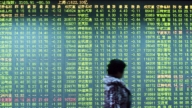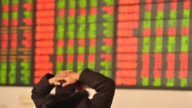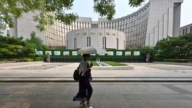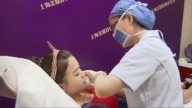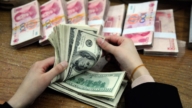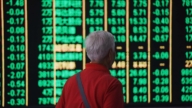【新唐人2013年08月06日訊】中共當局發佈的7月份製造業資料出現小幅上揚。然而,由滙豐銀行(HSBC)同一時間發佈的獨立調查則顯示,採購經理人指數(PMI)呈現下跌,中國製造商面臨的商業環境顯著惡化。分析指出,製造業的萎縮無疑會對以出口導向型的中國經濟打擊很大。請看報導。
英國《金融時報》報導,滙豐銀行8月1號發佈的中國7月份採購經理人指數(PMI)從前一個月的48.2跌至7月份的47.7,為11個月來的最低水準。
《法國國際廣播電臺》引述英國《路透社》的報導說,中國7月份的產出指數連續第二個月處在50下方,並創下10個月最低水準﹔新訂單的指數創下11個月最低位。
調查還顯示,大陸國內外市場狀況均轉弱,導致需求放緩。出口商反映來自歐洲、東南亞和美國的新訂單量全部環比下降。
然而,在同一時間,中共卻公布PMI指數從6月份的50.1增長到50.3。
製造業採購經理人指數是衡量經濟發展的一個指標,超過50表示經濟膨脹,低於50表示經濟收縮。
澳新銀行首席中國經濟學家劉利剛表示,中共發佈的PMI似乎有些失真,這可能會延誤政策調整時機,導致決策失誤。
中國金融智庫研究員鞏勝利:「全球聯合國成員國198個,像中國這樣的國家不超過4個,就是黨也納入國家的成本預算,也背在老百姓的頭上,這和所有法制國家來比的話,它就無緣無故的多出一塊。」
鞏勝利指出,中國不僅黨政雙重運行,而且7級構架制,遠多於美英法等國家的3到4級架構,導致行政成本大大提高﹔再加上國有企業的壟斷,無形中都抬高了商品的價格。
鞏勝利還表示,以美國主導的亞太自由貿易區和歐美自由貿易區,從今年10月實施後,還會對中國的出口造成更加致命的衝擊。
早在2009年,北京大學光華管理學院院長、經濟學家張維迎指出,2008年中國出口佔GDP的比重顯然過高,達到了37%。
《法新社》引述滙豐銀行專家表示,中國製造業7月份面臨的經濟形勢明顯惡化:需求持續不振,新訂單減少速度加快,就業崗位的減少的速度也是2009年3月份以來所未見的。
美國南卡羅萊納大學艾肯商學院教授謝田指出,全世界都知道中國產品是廉價、劣質的產品的代名詞,如果中共不保護智慧財產權、不限制仿冒產品,就不可能有自己的核心技術和高精尖的產品,就不能從製造業大國轉向技術型大國,就無法走出當前的困境。
鞏勝利: 「中國的貨幣現在投放量之大,它的出口依然在萎縮,還有中國的三駕馬車——投資、消費和出口,除了投資以外,其他的都拉不動,這種結果可以想像而知。」
鞏勝利認為,中共破壞了中國傳統的人文規範,目前經濟運行的品質、商品品質以及人文道德標準都位列世界最低行列。他指出,今年6月20號出現的錢荒絕不是偶然的,中國經濟還要出大事,已經到了嚴峻期。
日前,一位敘利亞女孩手拿標語:「中國(共),你們的道德比你們的產品還垃圾」,以示對中共政權的抗議。
美國南卡羅萊納大學艾肯商學院教授謝田:「中共越來越不得民心,在喪失民意的基礎上,實際上全社會的憤怒不滿、憎恨的情緒越來越嚴重,官民之間的對立越來越重。而經濟在其中可能起一個導火索的作用,會引發中國社會的不穩定。」
鞏勝利也指出,如果「習李黨政」不改革,改變「黨在政府之上」的現狀,蘇聯的結局就是中共的結局!
採訪/陳漢 編輯/宋風 後製/周天
Decline Of China’s Manufacturing Activity Affirms A Deteriorating Economy
The Chinese Communist Party (CCP) reported a small
improvement in China’s manufacturing activity in July.
At the same time HSBC’s independent survey reported
a drop in China’s Purchasing Managers’ Indexes (PMI).
This indicated that “Chinese manufacturers have to
face a notably worse business environment”.
Analysts comment that the decline of manufacturing activity
is definitely a great shock to China’s export-oriented economy.
Let’s see the following report.
According to the Financial Times’ report,
HSBC announced on Aug 1st that
China’s PMI of July dropped from June’s 48.2 to
47.7, reaching its lowest level in the recent 11 months.
Radio France Internationale (RFI) also quoted
a Reuters report that,
China’s output index declined to 10-month low and
remained in contraction for a second month;
the new orders sub-index also fell to its lowest level
in 11 months.
The survey also suggested that the market demand for China’s
product had become weaker both inside and outside China.
Exporters reported that the order numbers from Europe,
Southeast Asia and the United States had all dropped compared
to the same period of last year.
With all this being reported overseas, in the meantime the
CCP reported a PMI increase from June’s 50.1 to July’s 50.3.
PMI is an indicator of economic development.
If the number is over 50, there is an improvement in economic
activities, and a number below 50 suggests a decline.
ANZ Banking Group’s Chief Economist of Greater China Liu
Ligang said the CCP’s official PMI was likely to be distorted;
This might lead to mistakes in decisions such as missing
the right time to make policy adjustment.
Gong Shengli, researcher at a Chinese financial think-tank:
”Among 198 United Nations member states in the world,
no more than four states are the same as China in
incorporating the party’s cost into the national budget.
This burden is applied over the Chinese people.
Compared to other states’ legal systems,
this is an additional cost for no reason at all.”
Gong Shengli commented that,
besides the dual party-and-administration system,
China also has seven tiers in its administrative structure,
much more than that of Britain or France which only have between three and four tiers.
This results in a much higher administrative cost.
Along with the monopoly of state-owned companies,
all these invisibly raise prices of Chinese products.
Gong further said, after the US-oriented plan of free trade
area of the Asia-Pacific and Europe-America starts in October,
China’s export would face a more deadly shock.
Back in 2009, Zhang Weiying, Chinese economist and head of
the Guanghua School of Management at Beijing University,
pointed out that export was a significantly high proportion
of 37% in China’s GDP of 2008.
An AFP report quoted an HSBC bank expert that
China’s manufacturing industry was obviously seeing
a worse economic environment in July: market demand continues to be weak.
Dropping of order numbers becomes steeper; the number of
job opportunities also drops at a highest rate since March 2009.
Xie Tian, Professor of Aiken Business School,
University of South Carolina, stated that
Chinese products were known by the whole world
as being cheap and of low-quality.
If the CCP continues to ignore protecting intellectual
property rights and striking at counterfeit products,
it will never develop its own core technology and
high-tech products.
China will never be able to convert into a technology-
oriented state from a manufacturing-oriented state.
China will remain trapped in the current dilemma.
Gong Shengli: ”Despite the huge amount of money printed
by the CCP, China’s export is still declining.
Among the three driving forces of China’s economy of
fixed asset investments, retail sales and exports,
only the first one is stimulated and there is no improvement
for the other two. You can imagine what the results will be.”
Gong Shengli believes that, the CCP has destroyed
China’s traditional cultural norms.
Currently, the qualities of its economic operation, products
and moral standards are all among the worst in the world.
Gong said, China’s “money shortage” occurring
on June 20th was in no way an accident.
Some big things will happen to China’s economy and
now it has reached the critical moment.
Weeks ago, a photo showed a Syrian girl with a slogan saying
“China (the CCP), your morality is worse than your products”.
This was a protest against the CCP’s government.
Professor Xie Tian: ”The CCP is becoming increasingly
unpopular among Chinese people.
So grudges and resentment continue to accumulate
in the entire society.
This is leading to worse conflicts between
the government and the people.
Economic factors can be the blasting fuse to cause
further instability of Chinese society.”
Gong Shengli made a concluding remark that,
if Xi Jinping and Li Keqiang don’t reform to change
the current situation of “party over government”,
the CCP will end the same way as the Soviet Union.


